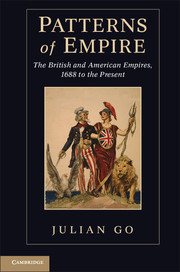Book contents
- Frontmatter
- Contents
- Preface and Acknowledgments
- List of Tables
- List of Figures
- Introduction
- 1 Imperial Paths to Power, 1688–1939
- 2 Colonial Rules
- 3 Hegemonies and Empires
- 4 Imperial Forms, Global Fields
- 5 Weary Titans
- 6 The Dynamics of Imperialism
- 7 Conclusion
- Appendix Notes on Data
- Archives and Abbreviations
- References
- Index
Introduction
Empires in Comparison
Published online by Cambridge University Press: 05 June 2012
- Frontmatter
- Contents
- Preface and Acknowledgments
- List of Tables
- List of Figures
- Introduction
- 1 Imperial Paths to Power, 1688–1939
- 2 Colonial Rules
- 3 Hegemonies and Empires
- 4 Imperial Forms, Global Fields
- 5 Weary Titans
- 6 The Dynamics of Imperialism
- 7 Conclusion
- Appendix Notes on Data
- Archives and Abbreviations
- References
- Index
Summary
We covet no territory, and we have no imperialistic ambitions.
– Sumner Welles, U.S. Secretary of State (1941)America has never been an empire. We may be the only great power in history that had the chance, and refused.
– President George W. Bush (2000)Our nations covet no territory…only a safer world.
– Donald Rumsfeld on the United States and Britain in Iraq (2003)America is not the crude stereotype of a self-interested empire. The United States has been one of the greatest sources of progress that the world has ever known. We were born out of revolution against an empire. We were founded upon the ideal that all are created equal, and we have shed blood and struggled for centuries to give meaning to those words – within our borders, and around the world.
– President Barack H. Obama (2009)These utterances by America's prominent statesmen represent a longstanding tradition of thought called “exceptionalism.” According to this tradition of thought, the United States has always been different from other countries. Unlike European nations, it lacks a feudal past. Born of an anticolonial revolution against a monarchy, it clings interminably to egalitarian, democratic, and liberal ideals. Because of this unique history and national character, the United States has never been an empire, nor could it ever be. George W. Bush's claim that America is “the only great power in history that had the chance [to be an empire] and refused” is one expression among many of this exceptionalist theme. Traditional scholarship on American foreign policy has espoused the same idea, consciously avoiding terms like “imperialism” or “empire,” and instead using terms like “diplomacy.” “One of the central themes of American historiography,” observed the historian William A. Williams in 1955, “is that there is no American empire.”
- Type
- Chapter
- Information
- Patterns of EmpireThe British and American Empires, 1688 to the Present, pp. 1 - 27Publisher: Cambridge University PressPrint publication year: 2011



